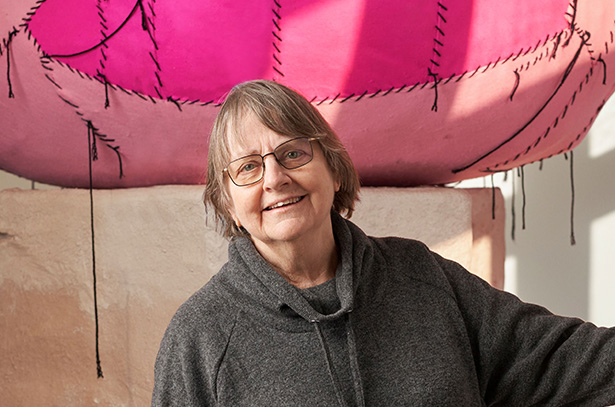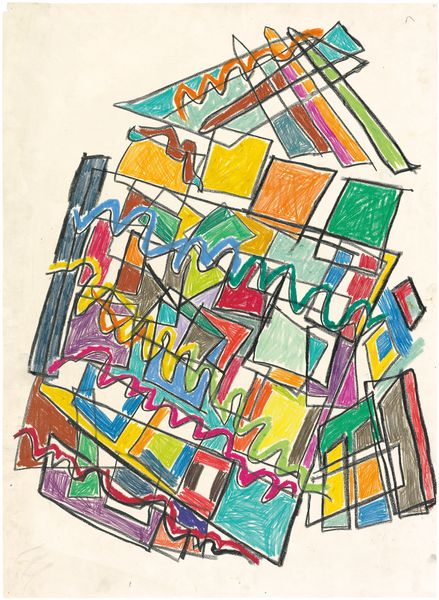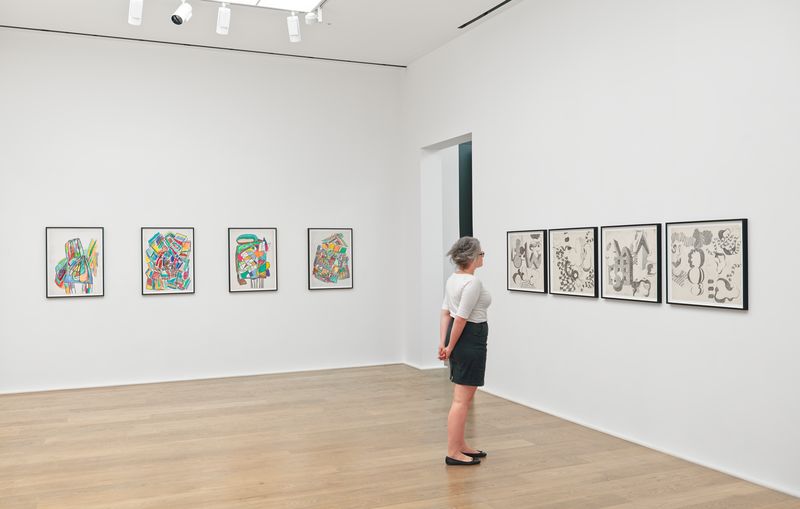Hauser & Wirth is delighted to unveil previously unseen drawings from Phyllida Barlow's archive, dating from her time at Chelsea School of Art in the 1960s to the present day. Now 70, most of Barlow's sculptures from the past five decades have been destroyed, leaving the drawing archive as the only surviving record of her earlier sculptural practice. Barlow's drawings chart major international art historical influences as she experiments with new ideas and processes, showing influences from Arte Povera, Pop Art and New British Sculpture amongst others.
Best-known for her colossal sculptural projects, drawing is an integral part of Barlow's practice; she draws before, during and after creating sculptures, both as a means of developing a working process and to visualise ideas which are later translated into three dimensions. Drawing provides Barlow with the freedom to improvise and engage directly with materials. The resulting works are fluid and incredibly dynamic. She works across media, using pencil, pastel, charcoal, acrylic and watercolour, always with the intense physicality evident in her sculptural work. Cross-hatching, scribbling or covering expanses of paper in washes of flat colour, her mark-making is at once deliberate and spontaneous. Consistent with her sculpture, Barlow's drawings make bold use of vibrant colour as a means of expression.
Early interiors from the 1960s are vaguely Cubist in sensibility, as doorways and corner walls are stacked on top of each other in a flat frontal view, and table-tops, ceramics and picture frames form abstract geometric shapes which further disrupt the room's composition. These early works are heavily stylised and objects are rendered in flat blocks of colour. Barlow uses broad architectural themes as a framework for unravelling space; doorways suggest vortexes between interior and exterior spaces as she brings the outside in and takes the inside out. Rather than on the objects themselves Barlow focuses on in-between spaces and the void.
Her drawings from the 1970s are characterised by a move towards abstraction as Barlow depicts in pencil lozenges, arcs and lumps of varying bulk. The original subject matter, only just identifiable through her reinterpretation of the world, is still grounded in interiors and landscape. In the 1980s Barlow employs heavy compressed charcoal to mark out freestanding pyramids, interlocking walls and maze-like structures. She makes liberal use of swathes of black, resulting in atmospheric industrial structures. Elsewhere she uses charcoal in a highly graphic way to create cartographical and labyrinthian sketches from her imagination.
Drawings from the last two decades depict a multitude of forms that reoccur throughout her sculptural practice – fences, awnings, barrels, staircases, cable winders, tower structures and lumpen masses of accumulated materials. In her more recent drawings the entire surface of the paper is a coloured ground, emphasising the encounter between an object and its surroundings.
Barlow's sculptural practice is grounded in an anti-monumental tradition and is often concerned with the relationship between objects and the space that surrounds them. This sculptural understanding of the world permeates her drawings which exhibit a 'breaking-down' of space. Freed from the confines of reality, paper becomes a space for adventure as Barlow creates unlikely compositions within her drawings which disregard the laws of physics; imagined structures balance precariously or are suspended in mid-air. Barlow's drawings are fascinating in themselves and also reveal the thoughts and processes behind her development as one of Britain's preeminent sculptors.
The exhibition is accompanied by the publication 'Phyllida Barlow: Fifty Years of Drawings', containing an interview with Hans Ulrich Obrist, published by Hauser & Wirth in association with JRP|Ringier, 2014.
About the Artist
Phyllida Barlow was born in 1944 in Newcastle upon Tyne, England. She lives and works in London. In the late 1960s, Barlow began teaching at the Slade School of Fine Art as Professor of Fine Art. In 2009, she retired from teaching in order to focus on her own work. In 2011 Barlow was selected a Royal Academician.
In July 2014, Barlow will present 'GIG', the inaugural exhibition at Hauser & Wirth Somerset, England. Her Duveen Galleries commission 'dock' remains on display at Tate Britain, London, England until 19 October 2014. Barlow's recent solo exhibitions include 'HOARD', Norton Museum of Art, West Palm Beach FL; 'Scree', Des Moines Art Center, Des Moines IA (2013); '... later', Hauser & Wirth New York NY (2012); 'Phyllida Barlow: siege', New Museum, New York NY (2012); 'BRINK', Ludwig Forum, Aachen, Germany (2012); 'Phyllida Barlow: Bad Copies', Henry Moore Institute, Leeds, England (2012); 'RIG', Hauser & Wirth London, Piccadilly (2011); 'Cast', Kunstverein Nürnberg, Nuremberg, Germany (2011); 'STREET', BAWAG Contemporary, Vienna, Austria (2010); and in 2010, she was in the critically acclaimed two-person show at the Serpentine Gallery, London, England with Nairy Baghramian. Recent group shows include 'Carnegie International 2013', Carnegie Museum of Art, Pittsburgh PA (2013); La Biennale di Venezia,'55th International Art Exhibition: The Encyclopedic Palace', Venice, Italy (2013); 'The Best of Times, The Worst of Times – Rebirth and Apocalypse in Contemporary Art', The First International Kiev Biennale, Kiev, Ukraine (2012); 'Before the Law', Museum Ludwig, Cologne, Germany (2011); 'Sculptural Acts', Haus der Kunst, Munich, Germany (2011); 'Displaced Fractures', Migros Museum für Gegenwartskunst, Zurich, Switzerland (2010).







































